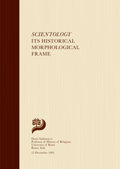The present report is aimed at answering the question of whether, in historic-religious scientific terms, Scientology should be considered as a religion under all circumstances. It did not deal with a certain lack of the “divine” and “eschatology,” nor with the presence of a codified ethics and of a reform politics. This is because neither the lack nor the presence of these characteristics is useful for the aim of scientific judgment.
In the founding of a science of religions, E.B. Taylor excluded from the definition of religion “the belief in a supreme divinity or in judgment after death.” Concerning this, we could add that in the case of Scientology there are no disparaging omissions, but omissions edifying a religious structure which factually transcends both theology and Christian eschatology.
To illuminate this, I will give the example of a specific divergence from the traditional eschatological line: With the concept of the thetan as an immortal being, completely outside the limitations of a historical period, or lifetime, eschatological discussion of “the end” has no meaning.
The present report answers any possible juridicial question by unequivocally stating that
Scientology is a religion...
In conclusion, what makes Scientology recognizable as a religion is first its resemblance to other religions (already established in this report). Further, and especially in light of the Western distinction between the “civic” and the “religious,” everything which is said or done in Scientology can and must make sense in our culture only if understood as a religion.
For this, the present report answers any possible juridicial question by unequivocally stating that Scientology is a religion—for its theoretical contents with the element of salvation; for its de-historifying ritual; for the proselytizing impulse of a prophetic kind; and for the ecclesiastical organization which, among other things, determines its own relationship with the organization of the states where it is welcomed among the citizens.
Dario Sabbatucci
12 December 1983




























